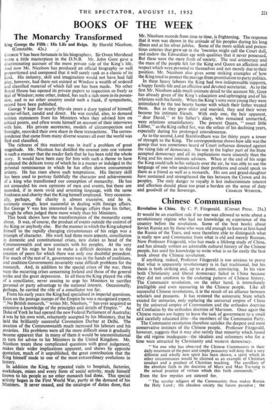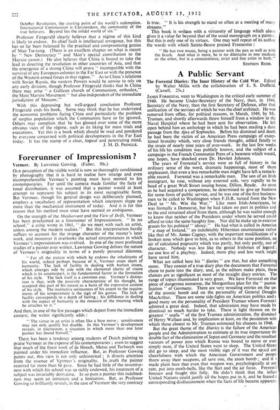Chinese Communism
Revolution in China. By C. P. Fitzgerald. (Cresset Press. 21s.) IT would be an excellent rule if no one was allowed to write about a revolutionary regime who had no knowledge oc experience of the country before the revolution. Some of the best books about Soviet Russia are by those who were old enough to know at first-hand the Russia of the Tsars, and were therefore able to distinguish what is really new and Communist from what is old and merely Russian. Now Professor Fitzgerald, who has made a lifelong study of China, and has already written an admirable cultural history of the Chinese people, has used his knowledge to write what is so far easily the best book about the Chinese revolution.
If anything, indeed, Professor Fitzgerald is too anxious to prove that what is apparently revolutionary is in fact traditional, but his thesis is both striking and, up to a point, convincing. In his view both Christianity and liberal democracy failed in China because they did not conform to the enduring pattern of Chinese history. The Communist revolution, on the other hand, is immediately intelligible and even reassuring to the Chinese people. Like all successful Chinese revolutions, it is the result of an alliance between scholar's and peasants. It has restored the autocratic State which existed for centuries, only replacing the universal empire of China by the universal empire of Communism and the orthodox doctrine of Confucius by the orthodox doctrine of Marxism. Once again the Chinese masses are happy to leave the task of government to a small and carefully educated élite—the members of the Communist Party.
The Communist revolution therefore satisfies the deepest and most conservative instincts of the Chinese people. Professor Fitzgerald, however, suggests that it may also satisfy that minority which found the old regime inadequate—the idealists and reformers who for a time were attracted by Christianity and western democracy.
"No one who has obsetved the Chinese Communists in their daily treatment of the poor and simple peasantry will deny that a very different and wholly new spirit has been shown, a spirit which in other circumstances would be claimed as an example of Christian conduct and a product of Christian teaching. The corollary of the absolute faith in the doctrine of Marx and Mao Tse-tung is the actual practice of virtues which this faith commends."
Even the few mystics are catered for.
"The secular religion of the Communists thus makes Russia the Holy Land ; the classless society the future paradise ; the
October Revolution, the starting point of the world's redemption. International Communism is Christendom, the community of the true believers. Beyond lies the, infidel world of sin."
Professor Fitzgerald clearly- believes that a regime of this kind is likely to endure. Its chief fault is intellectual arrogance, but this has so far been balanced by the•practical and compromising genius of Mao Tse-tung. (There is an excellent chapter on what is meant by " New Democracy " and Mao's special contribution to the Marxist canon.) He also believes that China is bound to take the lead in directing the revolution in other countries of Asia, and that the emergence of a strong China will prove " incompatible with the survival of any European colonies in the Far East or with the presence of the Western armed forces in that region." As to China's relations with Soviet Russia, the western Powers would be unwise to rely on any early division, though Professor Fitzgerald thinks that in China there may arise " a Gallican church of Communism, orthodox," the Most Marxist Movement" but also independent of the immediate jurisdiction of Moscow."
With this depressing but well-argued conclusion Professor Fitzgerald ends his book. Some may think that he has underrated the economic problems facing China and particularly the problem of surplus population which the Communists have so far ignored. Others may complain that he has glossed over some of the more Obvious vices of the regime, such as its liking for mass trials and executions. Yet this is a book which should be read and pondered by everyone concerned with political developments in the Far East today. It has the stamp of a clear,, logical and penetrating mind.
J. M. D. PRINGLE.



























 Previous page
Previous page